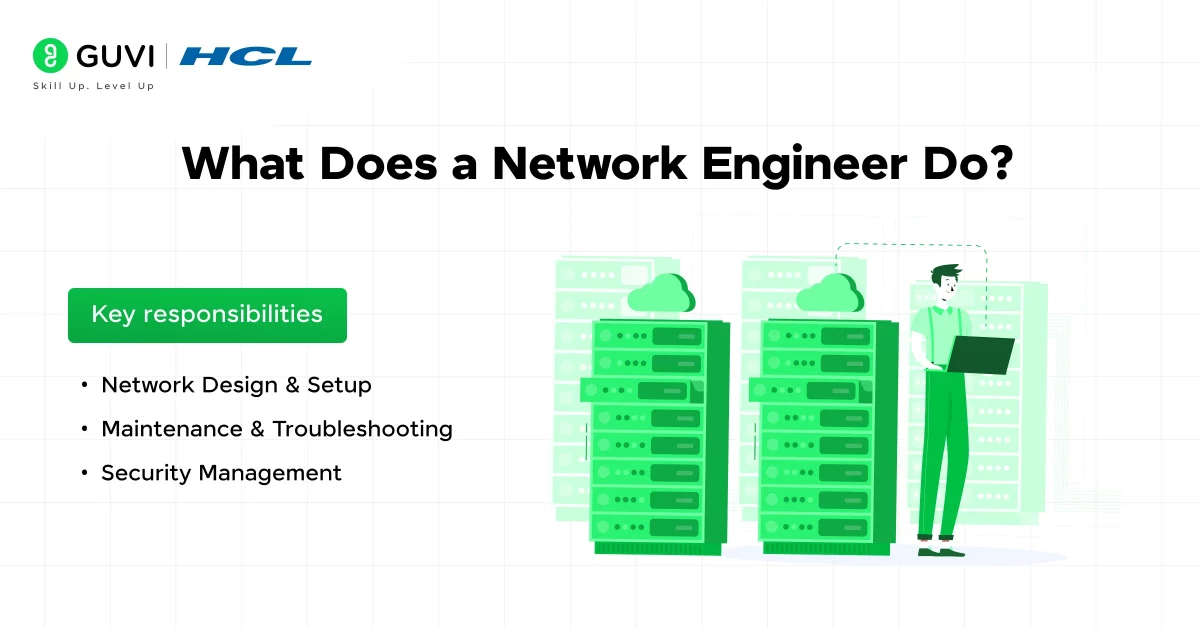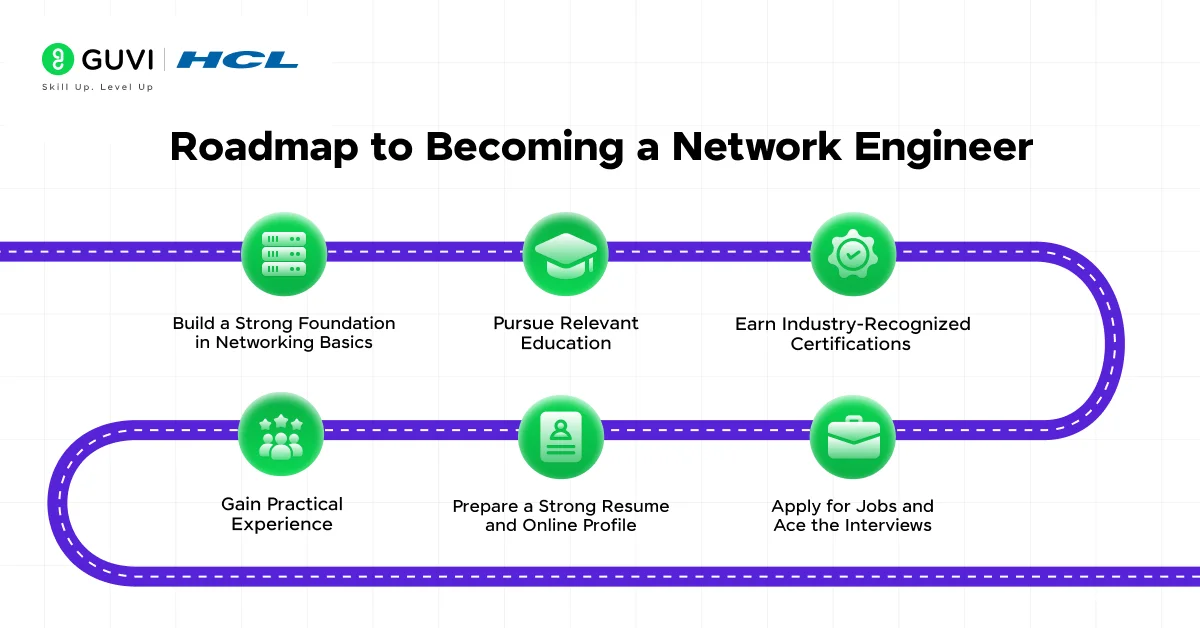
How to Become a Network Engineer? 6 Easy Steps To Get Started
Oct 10, 2025 6 Min Read 4615 Views
(Last Updated)
Have you ever wondered what really keeps the internet running behind the scenes, how data gets from your phone to a server halfway across the world in milliseconds? If that kind of invisible magic fascinates you, then a career in network engineering might be your calling.
In today’s hyper-connected world, network engineers are the architects of communication. They design, build, and secure the very systems that power our digital lives, from mobile networks and corporate infrastructures to cloud systems and IoT devices.
This article will provide you with a clear roadmap, from understanding what a network engineer does to how you can become one. By the end, you’ll know exactly what steps to take to kickstart your career in network engineering. So, without further ado, let us get started!
Table of contents
- What Does a Network Engineer Do?
- Why is Network Engineering a Promising Career in India?
- Job Stability and Salary of Network Engineers:
- Roadmap to Becoming a Network Engineer (Step-by-Step)
- Step 1: Build a Strong Foundation in Networking Basics
- Step 2: Pursue Relevant Education (Degree or Courses)
- Step 3: Earn Industry-Recognized Certifications
- Step 4: Gain Practical Experience (Projects, Internships, or Labs)
- Step 5: Prepare a Strong Resume and Online Profile
- Step 6: Apply for Jobs and Ace the Interviews
- Quick Quiz: Test Your Networking Knowledge
- Conclusion
- FAQs
- What qualifications are required to become a network engineer in India?
- Which certifications are most beneficial for aspiring network engineers?
- What is the average salary of a network engineer in India?
- How long does it take to become a proficient network engineer?
- What are the career advancement opportunities for network engineers?
What Does a Network Engineer Do?

A network engineer is responsible for designing, implementing, and maintaining the computer networks that organizations rely on for communication and operations. In simple terms, network engineers make sure that all the computers and devices in a network can “talk” to each other reliably and securely.
This can include local area networks (LANs) like those on a college campus or office, wide area networks (WANs) connecting offices across cities, and even cloud networks.
Key responsibilities of a network engineer typically include:
- Network Design & Setup: Planning network layouts (routers, switches, cables, Wi-Fi, etc.) and configuring equipment to establish efficient networks. This means you might design how data flows in a new office or optimize an existing network for better performance.
- Maintenance & Troubleshooting: Monitoring network performance, ensuring uptime, and fixing issues promptly when something goes wrong. For example, if a router fails or a cable is unplugged, you’ll diagnose the problem and restore connectivity.
- Security Management: Implementing firewalls, VPNs, and other security measures to protect the network from intruders and cyber threats. In practice, you’ll regularly update security protocols and respond to incidents to keep data safe.
India’s booming IT industry and digital transformation across sectors mean network engineers play a crucial role in banks, telecom companies, startups, educational institutions, and government offices alike. Now that you know what the role entails, let’s see why this is a promising career and how you can become a network engineer step by step.
Why is Network Engineering a Promising Career in India?

Choosing to become a network engineer in India can be a smart move for several reasons. First, the demand for networking professionals is rising rapidly as more businesses go digital.
According to industry forecasts, the need for skilled networking professionals is projected to grow by about 15% from 2022 to 2032 globally, driven by cloud computing expansion, cybersecurity needs, and remote work trends.
In India, this trend is very evident with companies modernizing their IT infrastructure and rolling out technologies like 5G and Internet of Things (IoT).
Job Stability and Salary of Network Engineers:
Network engineering offers long-term career stability. As organizations continue to digitize, network engineers are essential for maintaining critical infrastructure.
Once you enter this field, you can grow into senior positions; with experience and additional skills, many network engineers advance to become Network Managers, Architects, or IT Directors. The career path often looks like this:
- Entry-Level (0–2 years): Junior Network Engineer or Network Support Engineer. The salary of these entry-level candidates might start around ₹3–4 lakh per year.
- Mid-Level (2–5 years): Network Administrator or Network Engineer managing larger projects. They earn around ₹5–6 lakh per year
- Senior-Level (5+ years): Senior Network Engineer or Network Architect, possibly leading a team. Senior professionals can earn above ₹8–10 lakh annually.
Overall, network engineering in India is a rewarding career with strong prospects. You get to work on cutting-edge tech, solve important problems (keeping people connected and data secure), and enjoy solid growth opportunities.
Roadmap to Becoming a Network Engineer (Step-by-Step)

Entering the field of network engineering might seem daunting, but it becomes achievable when you break it down into clear steps. Here’s a step-by-step roadmap you can follow, from starting your learning journey to landing that first network engineer job.
Step 1: Build a Strong Foundation in Networking Basics
Every journey begins with learning the fundamentals. Start by strengthening your understanding of basic computer networking concepts. This step is crucial whether you’re a first-year engineering student or someone switching to networking from another field.
- Learn how networks work: Familiarize yourself with the core concepts like the OSI model, TCP/IP protocols, and basic networking terminology (LAN, WAN, router, switch, firewall, etc.).
- Understand network devices: Learn about the hardware that makes networking possible – routers, switches, modems, access points, and cables.
- Familiarize with IP addressing: Every device on a network needs an address. Get comfortable with IPv4 addressing (e.g., 192.168.1.1) and the idea of subnet masks, which define network segments
- Basic network services: Understand services like DNS, DHCP, and VPN. These services are part of everyday network operations.
Step 2: Pursue Relevant Education (Degree or Courses)
While it’s possible to enter networking from any background, having a formal education in a related field will significantly boost your chances. Most network engineers start with at least a Bachelor’s degree in engineering or computer science.
However, if you’re not from a CS/IT background, don’t be discouraged. Networking is a field open to anyone willing to learn. Here’s how you can acquire the necessary knowledge:
- College courses: If you are in college, take up electives related to Computer Networks, Network Security, or Telecommunications. Pay attention to labs where you might configure simple networks.
- Networking Academies and Institutes: Consider enrolling in reputable networking courses. Cisco Networking Academy offers courses aligned with certifications like CCNA, often through local partner colleges or online
Step 3: Earn Industry-Recognized Certifications
In the networking world, certifications are highly valued. They serve as proof that you have certain knowledge and skills, and they can significantly enhance your job prospects in India. Here are some key certification paths to consider:
- Cisco Certified Network Associate (CCNA)
- CompTIA Network+
- Cisco CCNP (Cisco Certified Network Professional)
Step 4: Gain Practical Experience (Projects, Internships, or Labs)
With knowledge and certifications in hand, the next step is to get real-world experience. This can sometimes be the chicken-and-egg problem for freshers: “Jobs want experience, but you need a job to get experience.” However, there are ways around this for a budding network engineer:
- Academic projects: If you’re still in college, leverage academic projects or your final year project to do something network-related. Perhaps design a campus network for your college or simulate a network security attack vs. defense scenario.
- Internships: Try to secure internships while studying or right after. Many companies offer internships in networking or IT infrastructure teams.
- Freelance or volunteer work: If formal opportunities are scarce, consider volunteering to manage networks for a small business, NGO, or even your college fest event. Setting up the Wi-Fi and LAN for a college festival or helping a local business secure its network can be a real experience.
- Lab assistant or campus network assistant: If your university has an IT department, sometimes they take student volunteers or part-timers to help with the campus network or computer labs. This can be a convenient way to get experience during your studies.
When you’re just starting, any exposure is good exposure. Over time, aim to accumulate at least 6-12 months of practical experience (through internships, projects, or that first job). This will make you much more confident and employable as you step fully into the professional world.
Step 5: Prepare a Strong Resume and Online Profile
By this point, you know, maybe a certification or two, and some hands-on experience – now you need to present all that to potential employers. It’s time to market yourself:
- Craft your resume: Make a concise, clear resume tailored for network engineering roles. Highlight your education, any certifications, and the skills you’ve acquired, Network Troubleshooting, TCP/IP, Linux, Network Security Basics, etc..
- Create a LinkedIn profile: In India, LinkedIn is widely used by recruiters for IT roles. Ensure you have a professional LinkedIn profile that mirrors your resume.
- Showcase your projects: If you have done lab projects or written case studies, consider creating a simple portfolio. This could be a personal website or even a GitHub repository where you write a README about your project and include network diagrams or configuration snippets.
This preparation will ensure that when you start applying (next step), you make a good impression on paper (or screen). Make it neat, use action verbs to describe experiences (“managed,” “configured,” “implemented”), and keep it relevant to networking.
Step 6: Apply for Jobs and Ace the Interviews
Now comes the moment of truth – landing a job. With all your preparation, you are ready to enter the job market as an aspiring network engineer. Here’s how to go about it:
- Job search strategy: Look for entry-level network engineer positions or related roles. Popular Indian job portals like Naukri.com, LinkedIn Jobs, Indeed, and Glassdoor are great places to start. Use keywords like “Network Engineer – Fresher”, “CCNA fresher”, “Network Support Engineer”, etc.
- Leverage campus placements: If you’re in a college that has campus recruitment, see if companies offering network roles visit. Sometimes, big network equipment companies or IT services firms come for campus hiring of network engineers.
- Networking (the career kind!): Use your network of contacts to discover opportunities. Let professors, mentors, or former internship colleagues know you are job hunting. They might refer you if they hear of openings.
- Prepare for technical interviews: Network engineering interviews for freshers in India typically include both technical questions and, sometimes, practical tests. Be ready to answer fundamentals: What is the OSI model? Explain how ARP works. What’s the difference between a router and a switch? How does a ping work? – These are common questions to test your basic knowledge.
- Hands-on or written tests: Some interviews might have a written test or an online quiz, which could include subnetting problems (e.g., “Given this IP and mask, determine the network range”) or simple troubleshooting scenarios.
- Soft skills and attitude: While technical skill is core, companies also look for problem-solving approaches and communication. As a network engineer, you might be working in a team or helping non-technical people. So expect a few HR or behavioral questions as well.
Hiring trends in India indicate that entry-level network engineers who have certification plus some internship/project experience are seen as ideal hires. There’s also a growing demand for those who, besides core networking, have exposure to related areas like cloud or cybersecurity.
Quick Quiz: Test Your Networking Knowledge
Here’s a short and fun quiz to challenge your basic networking know-how. Try to answer these questions yourself before checking the answers:
- Expand the acronym “LAN”. What does it stand for, and what does it refer to?
- What device would you primarily use to connect two or more different networks together? (Hint: It directs data packets between networks)
- Which layer of the OSI model is responsible for routing packets between devices on different networks?
- Name one industry-standard certification for network engineers and the company or organization that offers it.
- Bonus: Your home Wi-Fi is not working. What are two basic troubleshooting steps you would take first?
Take a moment to think about your answers… Ready to check? Here are the answers:
Answers:
- LAN stands for Local Area Network. It refers to a network covering a small geographic area, like a home, office, or campus – basically, it’s a network of computers/devices in a localized area (as opposed to WAN, which is a wide area network over larger distances).
- A Router. Routers operate at the network layer to connect multiple networks and route traffic between them. (Switches, in contrast, connect devices within the same network.)
- The Network Layer (Layer 3) of the OSI model handles the routing of packets. This is where IP (Internet Protocol) operates, deciding how packets travel from source to destination across networks.
- There are several. For example, CCNA (Cisco Certified Network Associate) offered by Cisco is a popular one. Another is CompTIA Network+, offered by CompTIA. (Other valid answers: CCNP by Cisco, JNCIA by Juniper, etc., depending on what you recall.)
- Basic troubleshooting for home Wi-Fi could include: (a) Checking if the router is powered on and cables are properly connected, (b) Restarting the router (power cycling), (c) Ensuring your device’s Wi-Fi is turned on, (d) Checking if other devices can connect (to isolate if the issue is with the Wi-Fi or your single device), or (e) Running a ping test to the router’s IP (usually 192.168.1.1) to see if there’s a connection.
How did you do? If you got most of these right, you’re on the right track! If some terms were unfamiliar, that’s a sign of areas to brush up on. Networking is vast, but quizzes like this help reinforce the basics.
If you want to learn Networking that happens predominantly in Cloud Computing deeply through Azure, consider enrolling in HCL GUVI’s Cloud Computing with Azure Course, which will arm you with the skills and knowledge to engage with the power of Microsoft Azure’s cloud services.
Conclusion
In conclusion, starting as a network engineer in India, you have a lot to look forward to – a stable career, continuous learning (network tech never stands still), and a respectable income that grows with your expertise.
With the IT boom in India and initiatives to develop smart cities and better digital infrastructure, network engineers will be at the heart of these advancements. Keep honing your skills and stay updated with industry trends, and you’ll likely enjoy a fulfilling career path.
Lastly, enthusiasm and persistence are key. The journey might be challenging at times but with consistent effort, you can become a successful network engineer.
FAQs
1. What qualifications are required to become a network engineer in India?
To embark on a career as a network engineer in India, a bachelor’s degree in Computer Science, Information Technology, or Electronics & Communication Engineering is typically preferred.
2. Which certifications are most beneficial for aspiring network engineers?
Several certifications can bolster your credentials:
– Cisco Certified Network Associate (CCNA)
– CompTIA Network+
– Juniper Networks Certified Associate (JNCIA)
– Microsoft Certified: Azure Network Engineer Associate
3. What is the average salary of a network engineer in India?
The average salary for a network engineer in India varies based on experience and location. Entry-level positions may start at around ₹3.65 lakhs per annum, while experienced professionals can earn up to ₹21 lakhs annually.
4. How long does it take to become a proficient network engineer?
The timeline to become a proficient network engineer depends on your educational background and dedication. Typically, it takes about 2 to 4 years, encompassing a bachelor’s degree and the acquisition of relevant certifications.
5. What are the career advancement opportunities for network engineers?
Network engineering offers diverse career paths. With experience, professionals can advance to roles such as Network Analyst, Network Administrator, or Network Manager. Specializations in areas like cybersecurity, cloud networking, or network architecture are also viable, often accompanied by certifications like CCNP or CCIE for higher-level positions.




































Did you enjoy this article?